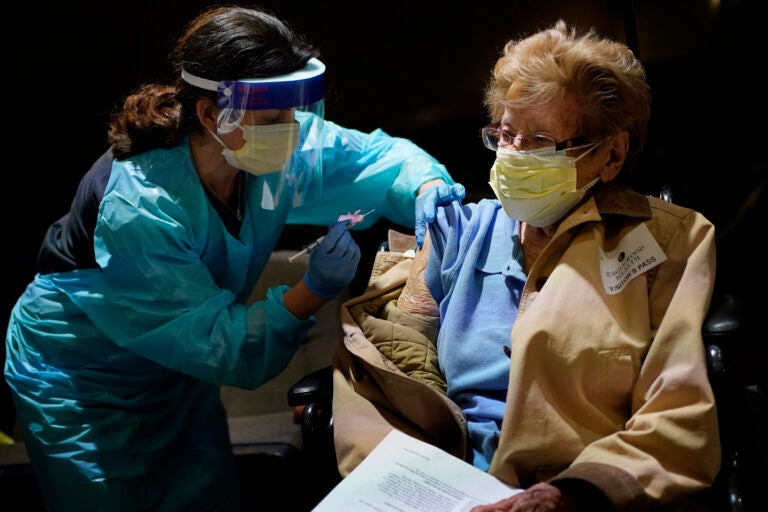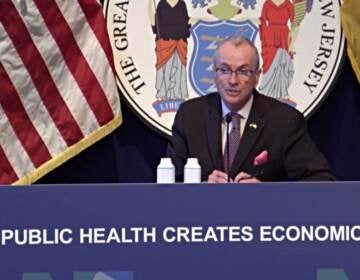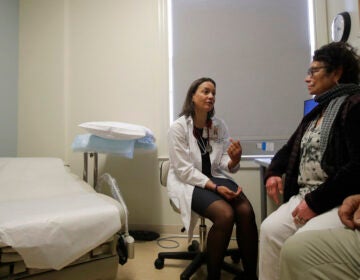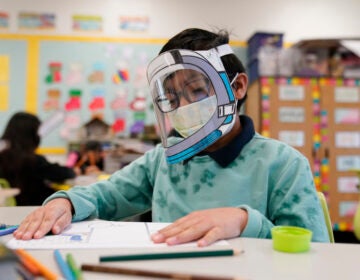New Jersey ‘failed’ to have an adequate response to COVID-19 pandemic, report finds
The report found that the state was not prepared to manage the crisis with limited resources, which was aggravated by the global supply chain breakdown.
Listen 1:08
Helen Fitzpatrick, 97, right, receives a COVID-19 vaccine administered by Dr. Hillary Cohen at Englewood Health in Englewood, N.J., Thursday, Jan. 14, 2021. (AP Photo/Seth Wenig)
From Camden and Cherry Hill to Trenton and the Jersey Shore, what about life in New Jersey do you want WHYY News to cover? Let us know.
The long-awaited review of New Jersey’s response to the COVID-19 pandemic has arrived and the state did not look good. Neither did the Federal Government.
Within the dedication statement of the 910-page report, Paul H. Zoubek of Cherry Hill-based Montgomery McCracken Walker & Rhoads LLP wrote, “We collectively failed as a nation and as a state to be adequately prepared.”
“Neither the State nor the Federal Government had clear, executable plans in place to respond to and manage such limited resources in an uncertain and rapidly evolving environment,” he said.
The report, dedicated to the tens of thousands of Garden State residents who died from the coronavirus, examined the actions of 31 state agencies, focusing mainly on the governor’s office, Health Department and the Office of Emergency Management, which is under the State Police.
Gov. Phil Murphy said the report “highlights numerous examples of New Jersey’s strong leadership during the crisis, and identifies gaps in preparedness and structural deficiencies that must be addressed.”
“I know New Jersey will be better off because of this review,” he said. “My administration looks forward to working with the Legislature on its recommendations.”
A ripe target compounded by inequities
According to the report, New Jersey was ripe to be hit in the first wave when COVID arrived in the United States, due to its dense population and location between New York and Philadelphia.
It confirmed scathing federal and state reviews of missteps taken to protect residents in the state’s veterans’ homes.
“We acknowledge that substantial reforms have been made to Veterans’ Homes in New Jersey, with additional changes being implemented,” the report stated. “This report reviews those reforms and makes further recommendations.”
The report also found that the pandemic worsened existing inequities in “areas where society or institutions were already weak.”
“The disproportionate mortality rate for Black and Hispanic New Jerseyans was not a result of COVID-19’s pathology, but the result of systemic inequities built into the health system long before the disease arrived,” the report said.
Emergency plans are no good if they are on the shelf and forgotten
The New Jersey Department of Health created a “Pandemic Influenza Plan” in 2015, which the report stated “was extremely accurate in predicting what would eventually happen during the COVID-19 pandemic.”
“It included specific recommendations about actions that could be taken; organizational structures for emergency management; and detailed factual, legal, and regulatory resources that could be consulted,” the report found.
Yet, no one knew the plan existed when the pandemic hit.
“Several people in government told us they thought ‘some other agency’ ought to have an Emergency Preparedness Manager,” the report stated. “In fact, that position exists (and is staffed) in the other agency, but the people we spoke with were unaware of that fact.”
‘Cynical’ attacks on basic information were ‘a tragedy’
According to the report, communities were polarized over the decision to mask, socially distance or get vaccinated.
“The decision[s]…[were] freighted with political overtones,” the report found. “Lives were lost to the misinformation — both deliberate and unintentional — which surrounded the pandemic.”
Masking was discouraged in the early days of the pandemic in favor of surface cleaning. Officials did not know that COVID-19 could be transmitted through the air at the time.
Even if state officials were aware of that fact, the report found the state’s stockpile of facemasks and other personal protective equipment was “insufficient” and that global supply chain breakdowns “prevented quick acquisition of additional supplies.”
“While New Jersey had a small stockpile of old masks left over from a prior health crisis, these were expired,” the report stated. “As a result, many who should have had access to multiple masks per day were required to improvise and either re-use masks — meaning that the masks themselves could be carrying the virus into a new environment — or go without.”
The report suggests that had mask supplies been adequate, the state could have emerged from lockdowns and closures sooner.
“New Jersey could have re-opened many indoor locations sooner with universal masking,” it stated. “The State could also have allowed public use of outdoor recreation sooner, assuming that there was an adequate supply of masks and people opted to use them.”
Despite the findings, New Jersey is credited for implementing measures such as mask mandates and social distancing guidelines that resulted in “dramatic improvements” over the course of the pandemic.
“By the Delta and Omicron Wave, New Jersey became one of the states with the lowest death rates,” the report stated.
Regardless, the report also recognized the other negative consequences in addition to the lives lost.
“Shutdowns had disastrous effects on business and commerce,” it said. “School closures not only led to lost learning for students, but huge burdens on families with school-age children whose parents had to figure out how to keep their children happy, healthy, and learning.”
The state needs to have a plan and improve health equity
Among the recommendations, the report calls on state officials to create emergency plans and train on them, invest in improving health equity in the state, and build partnerships with community organizations, the health care industry, local health departments, and beyond.
The report also recommends improving collaboration and communication during an emergency response and investing in technology to support a response.

Get daily updates from WHYY News!
WHYY is your source for fact-based, in-depth journalism and information. As a nonprofit organization, we rely on financial support from readers like you. Please give today.






